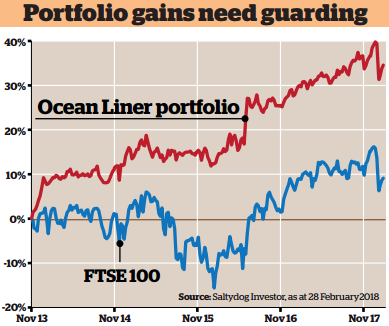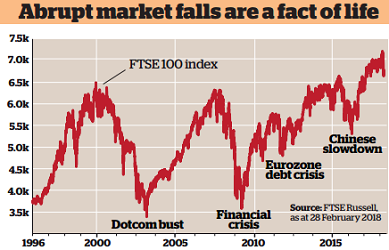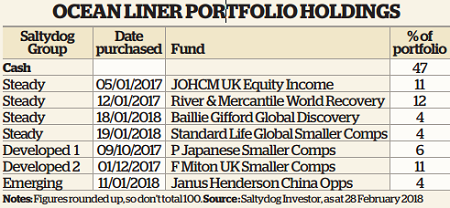Saltydog Investor cashes in funds amid 'correction' debate
28th March 2018 10:41
by Douglas Chadwick from interactive investor
Share on
This content is provided by Saltydog Investor. It is a third-party supplier and not part of interactive investor. It is provided for information only and does not constitute a personal recommendation.
The Dow Jones Industrial Average index recently suffered its largest single-day fall of the past six years – this came after one of its largest one-year rises. Other world markets then endured similar falls. Yet, for people who had been invested in the bull market for some time, the fall probably wiped out just a small fraction of their gains. So why all the upset? Why do we feel so unsettled?
It's because we don't know what direction markets are going to take, and we really, really hate that uncertainty. Is this a minor blip, or are we heading for a major correction? Who knows: market overpricing and the potential consequences of rising inflation are worrying, but countering that, the world economy is said to be growing. So where to next?
Lessons from history
There are those who say we are due for another major correction because that is just the way of the world. At Saltydog we have some sympathy with that statement when we look at the 25-year graph of the FTSE 100 index.
For a variety of reasons these corrections do occur. At the turn of the century, there was the bursting of the dotcom bubble, and then in 2008/09 a full-scale financial crisis. More recently, in 2011, there was the eurozone crisis. In 2015 there was a panic over a dip in growth in China. Corrections are like rogue waves at sea: they are just going to happen. However, that is not to deny the presence of signs that suggest being cautious is the correct approach.

Past performance is not a guide to future performance
We have just experienced a minor roller which might or might not be the precursor to an investment market tsunami. So, in our book, it was a straightforward decision: we have put on our life jackets and sold off some of our funds to hold cash.
If nothing adverse materialises, then we have lost a gain and will buy back in again later, but if the worst happens and the markets do crash, we will suffer less of a loss than we would have. That is our preferred position. We are not in the lifeboat yet, but we do have one hand on the gunwale.

Past performance is not a guide to future performance
We at Saltydog are not financial shamans, but just ordinary do-it-yourself investors with access to fund performance numbers. We are in the same position as you, and like you we are bombarded by commentary about CAPE (the cyclically adjusted price/ earnings ratio, which measures performance), VIX (the volatility index) and articles written by readers of chicken bones, all telling us that we should be able to see what is going to happen next.
Well we can't, and nor can they. The only thing we do know is that in the past when there have been falls, the recovery time varies from a few weeks to more than 12 months. You can take precautions and reduce your exposure to the markets, or you can stay where you are and see what happens. You pay your money and takes your choice, quite literally.
At times like this, I am reminded of two quotations attributed to the US investor and analyst Jesse Livermore. The first: "No person can accurately predict what will happen in the future, and you should not listen to people who tell you that they can."
The second: "A market moves in the way it moves because it does. There are more buyers than sellers, or vice versa. Just accept that it has done what it has done and move on. There is little to be gained by putting your own take onto market movements after the event."

This article was originally published in our sister magazine Money Observer. Click here to subscribe.
These articles are provided for information purposes only. Occasionally, an opinion about whether to buy or sell a specific investment may be provided by third parties. The content is not intended to be a personal recommendation to buy or sell any financial instrument or product, or to adopt any investment strategy as it is not provided based on an assessment of your investing knowledge and experience, your financial situation or your investment objectives. The value of your investments, and the income derived from them, may go down as well as up. You may not get back all the money that you invest. The investments referred to in this article may not be suitable for all investors, and if in doubt, an investor should seek advice from a qualified investment adviser.
Full performance can be found on the company or index summary page on the interactive investor website. Simply click on the company's or index name highlighted in the article.